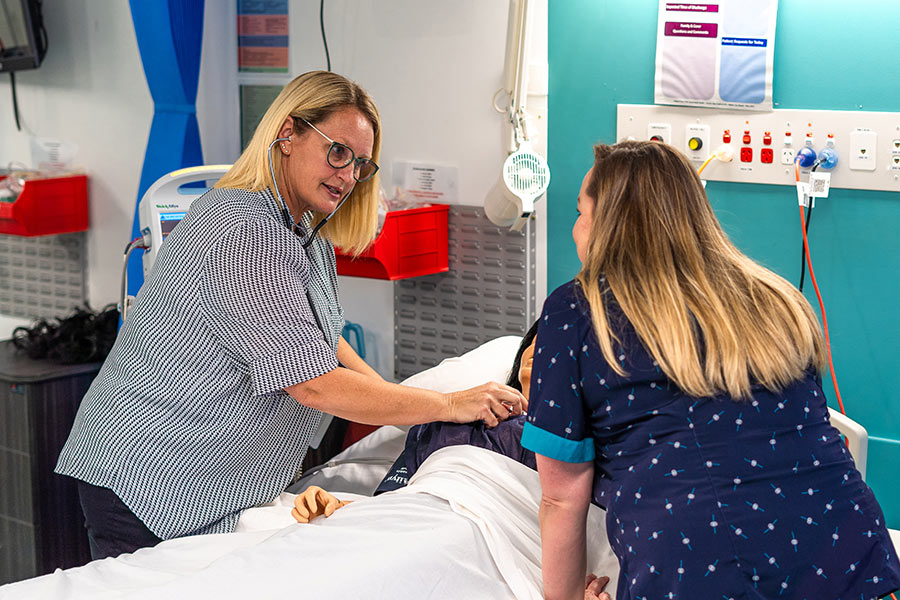Using AI to implement a single patient record for seamless care
Dr Michelle Stubbs
Current healthcare systems are often fragmented and inefficient. But through her work with NSW Health, Dr Michelle Stubbs is showing how AI and digital tools can streamline care, improve outcomes and build trust in new technologies.

Passionate about advancing healthcare through research and education, Michelle is a registered nurse, a lecturer, and the nursing program convenor at the University of Newcastle’s School of Nursing and Midwifery.
During her PhD, Michelle’s thesis examined neuropsychiatric diseases—specifically anxiety and depression—in people with severe asthma and utilised contemporary arts-based methodologies.
Since then she has made research contributions on projects that explore healthcare professionals’ experience of grief and loss in residential aged care facilities, attitudes, knowledge and behaviours towards COVID-19 vaccines and the experiences of nursing leadership.
In her pursuit of innovation in healthcare, Michelle is now tackling an exciting new area: the intersection of digital health records and artificial intelligence (AI). Her research focuses on how AI can support healthcare professionals, including doctors, nurses, and students.
"The field of digital health and AI is evolving rapidly," Michelle explains. "I wanted to be part of something that will shape the future of healthcare. The potential for innovation and improvement in healthcare practices and education really drew me in. I want to contribute to something transformative."
A Single Digital Patient Record (SDPR)
One of Michelle’s main projects, set to run until 2029, involves collaborating with NSW Health to implement a Single Digital Patient Record (SDPR) in the region.
"Currently, patient records are scattered across multiple locations, which can be quite confusing," Michelle notes. "This new system aims to create a 'one-stop-shop' for medical records, enhancing the efficiency of healthcare delivery and allowing students at our university to learn using the latest technology."
A key challenge in this initiative is ensuring that healthcare professionals can access patient information seamlessly and securely.
Ultimately, the goal is to leverage AI and digital systems to streamline communication between healthcare providers, improving the accuracy and speed of medical care while reducing errors and enhancing patient outcomes.
Elevating outcomes with AI innovation
The SDPR system allows healthcare professionals to access patient information, document care, order diagnostic tests, and manage medications across public hospitals and community healthcare facilities.
“It will ultimately make patient care more efficient, reducing waiting times and improving the accuracy of diagnoses and treatments,” says Michelle.
Its key features include holistic, real-time patient information from a single system, improved integration with medical devices, and an intuitive user interface that pre-fills records using historical patient data.
Additionally, it ensures secure access to patient records via mobile devices. It simplifies clinical workflows while enhancing privacy and security measures. The system also provides robust analytics and reporting capabilities, fostering ongoing improvements in health services and patient safety.
AI plays a crucial role in the SDPR by enabling many of these features, from real-time data integration and predictive analytics to allowing for pre-filled records based on historical data and reducing administrative burdens, plus AI-backed security,
“For patients, the implementation of the state-wide SDPR system will enhance continuity of care”, says Michelle
“This will reduce the need to repeatedly provide health information and ensure a consistent experience regardless of where they seek treatment.
“They’ll benefit from more informed discussions with their healthcare providers, empowering them to make better decisions about their health.”
Local success; global adoption
To date, there’s been a lot of resistance to using these technologies in healthcare. One of the barriers is a simple resistance to change the other has been concerns around privacy and data security.
However, implementing pilot programs like the SDPR can demonstrate the effectiveness of new technologies.
“Nationally,” says Michelle, “the project can serve as a model for other states in improving healthcare delivery through digital transformation.”
She also believes this research is making a difference globally, by contributing to the conversation around integrating AI and digital health in healthcare systems, showing how technology can enhance patient care.
“The more healthcare professionals and patients understand about these technologies and see them in successfully, and securely, in action, the easier the acceptance and adoption into healthcare will be.”
Shaping the future of healthcare
Michelle is proud of how her research is driving real change in healthcare.
“Seeing healthcare professionals and students adapt to new technologies and knowing that it will lead to better patient outcomes is incredibly rewarding”, she says.
“It’s exciting to be part of a field that is shaping the future of healthcare and contributing to more efficient, patient-centred care.
In addition to her research work, Michelle sits on the Board of the College of Health, Medicine and Wellbeing and is the Chairperson for the College’s Wellbeing Sub Committee.
She also organises Pit Stop Health, a University of Newcastle health promotion activity that can be found at the Newcastle Show, University Open Days and Merewether Beach once a month.
The University of Newcastle acknowledges the traditional custodians of the lands within our footprint areas: Awabakal, Darkinjung, Biripai, Worimi, Wonnarua, and Eora Nations. We also pay respect to the wisdom of our Elders past and present.
